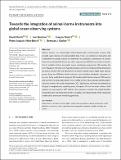Towards the integration of animal-borne instruments into global ocean observing systems
Abstract
Marine animals are increasingly instrumented with environmental sensors that provide large volumes of oceanographic data. Here, we conduct an innovative and comprehensive global analysis to determine the potential contribution of animal‐borne instruments (ABI) into ocean observing systems (OOSs) and provide a foundation to establish future integrated ocean monitoring programmes. We analyse the current gaps of the long‐term Argo observing system (>1.5 million profiles) and assess its spatial overlap with the distribution of marine animals across eight major species groups (tuna and billfishes, sharks and rays, marine turtles, pinnipeds, cetaceans, sirenians, flying seabirds and penguins). We combine distribution ranges of 183 species and satellite tracking observations from >3,000 animals. Our analyses identify potential areas where ABI could complement OOS. Specifically, ABI have the potential to fill gaps in marginal seas, upwelling areas, the upper 10 m of the water column, shelf regions and polewards of 60° latitude. Our approach provides the global baseline required to plan the integration of ABI into global and regional OOS while integrating conservation and ocean monitoring priorities.
Citation
March , D , Boehme , L , Tintoré , J , Vélez-Belchi , P J & Godley , B J 2019 , ' Towards the integration of animal-borne instruments into global ocean observing systems ' , Global Change Biology , vol. Early View , pp. 1-11 . https://doi.org/10.1111/gcb.14902
Publication
Global Change Biology
Status
Peer reviewed
ISSN
1365-2486Type
Journal article
Description
Funding: BBVA Foundation (“Ayudas Fundación BBVA a Equipos de Investigación Científica 2016”) and the European Union’s Horizon 2020 research and innovation programme under the Marie Skłodowska-Curie grant agreement No 794938; Spanish Government (grant “Juan de la Cierva-Formación” FJCI-2014-20064, grant “José Castillejo” CAS17/00193) (D.M.).Collections
Items in the St Andrews Research Repository are protected by copyright, with all rights reserved, unless otherwise indicated.

